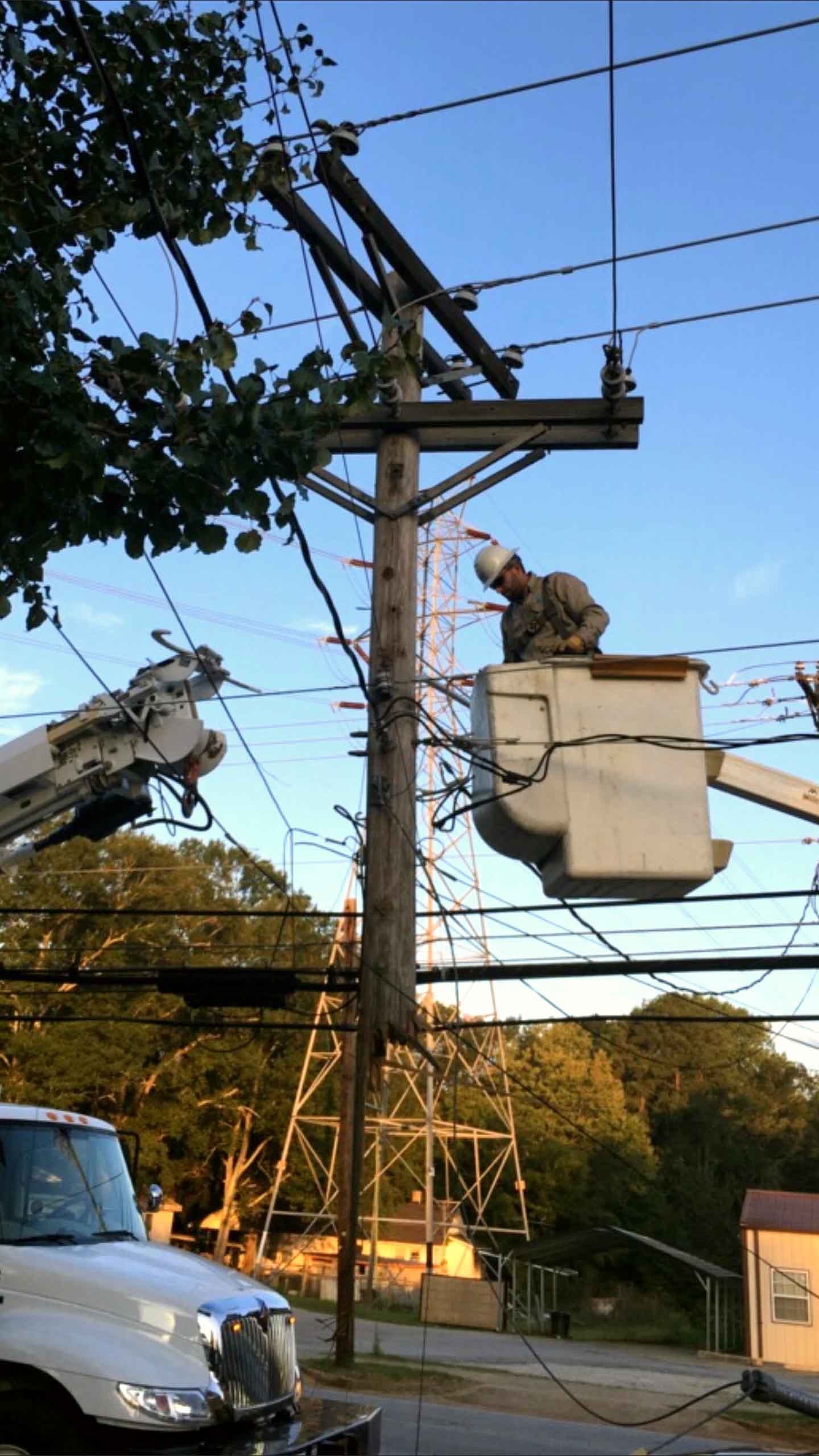It's one of the most welcome sights after a hurricane blows through or an ice storm freezes a town: a utility truck rolling into the neighborhood with linemen aboard, ready to climb poles, repair lines and restore power.
Linemen install, maintain and repair high-powered electrical lines, scale poles to repair overhead lines, and inspect lines in need of repair or replacement. In some cases, they install underground lines. It's a job that often finds them working outdoors at a time when everyone else wants to be indoors, safe and protected from the elements.

Kalen Sipes describes line work as a rewarding job that allows him to help others
in difficult situations. Photo: Laurens Commission of Public Works.
"I guess looking from the outside it looks miserable, but to be honest it's a great satisfaction to be able to do this kind of work," said Kalen Sipes, a lineman for the Laurens Commission of Public Works. "To be able to be out in those conditions, it's an adrenaline rush. And it's a fulfillment, helping people who can't help themselves in that situation."
In some ways, Sipes, who has done line work for about a decade, was born into the job. His father spent his career working for the utilities department. When he was growing up, there was always a bucket truck parked in his family's yard, ready to respond to neighbors in need.
"I respected what he did and I looked up to him as a leader," Sipes said. "I knew that was the kind of person I wanted to be."
Robert Lance of Seneca Light and Water began working in the utilities department the summer after he graduated from high school. What he expected to be just a summer job turned into a career. He did line work for 23 years and now is the electric department manager.
"I liked being outside, the construction part of it," Lance said. "It's a service you're providing to the community, you're helping people out. That's an exciting day for a new homeowner, when they get their electricity turned on."
A typical day for linemen — when they aren't responding to emergency calls — can involve changing out poles that have been damaged or have rotted. Linemen must inspect poles continuously to see if there are any signs of rotted wood or undetected water damage. Poles can also be damaged by falling trees or vehicle collisions.
A pole can be anywhere from 30 to 60 feet tall. Replacing one is a big job, typically performed by two linemen working above in a bucket truck with others on the ground providing them material. The workers replace not only the electrical lines and transformers, but any other utility lines that are connected to the pole, like telephone or cable lines.
Other duties for line crews include installing connections for new construction, substation work, reconnecting lines to larger conductors, underground installation and converting overhead lines to underground ones, which can be more common in some downtown areas.
Line work can, of course, be dangerous.
"You always have to be aware of your surroundings. We work on energized lines," Lance said. "You can't physically look at them and tell they are energized. You have to constantly test it."
And it's not just the electricity that can be dangerous.
"Sometimes, we are out there before a storm is over, in a bucket truck when there's hurricane winds. We're out there in the rain. Or, we're on the side of the road changing a pole and people on their phones are walking by, not paying attention," Sipes said. "Yes, it can be dangerous."
Even so, it can be rewarding public service work.
Sipes remembers a night a few years ago when a strong storm blew through Laurens. He was on call when he got the word that a large tree had fallen across the carport at an elderly couple's house, crushing their car and ripping the power lines out of their home.
"I was the first one on the scene, and the look on their faces was just devastation. They had no power, and their car was under the tree. They didn't know what to do," he said. "That touches you a little bit. I was able to get the power [line] over the tree and hooked to the house. They hugged me. That's what means a lot to me. The money is a big thing, but helping people is another big thing. Especially people who can't get out and take care of it."
Along with working regular eight-hour, five-days-a-week schedules and on-call shifts, linemen also respond to emergencies outside the town limits, to help out neighboring cities or states where hurricanes or other storms have caused massive power outages.
"Most linemen are itching to go, to help people out," Lance said. "It's hard work during storms — long hours, difficult conditions. But it's rewarding to line crews to be able to say we went and restored power. We make sure there is nothing standing in the way to help people get back to normal life."
Since 2013, April 18 has served as National Lineman Appreciation Day, a time to recognize those in the profession who labor high in the air, around the clock, and immediately after storms or other disasters to provide steady and safe power to their communities.
